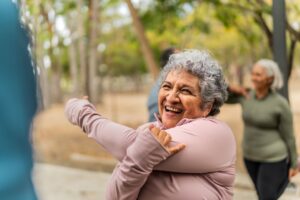Winter can be challenging for many – especially when it comes to maintaining good health. Cold months can damper our routines that keep us physically active or socially engaged. And that means our well-being is at risk.
Protecting overall health
During the winter, people are indoors more, which allows viruses to spread more easily. The change in temperature and humidity can worsen chronic conditions and the cold, dry air may weaken resistance. But with a few preventative measures, supporting overall health is possible.
- Get vaccinated. Flu season is at its peak in winter, and the CDC recommends that everyone 65 and over get a flu shot. This simple step can reduce flu risk by up to 60%.
- Manage chronic conditions. Cold weather can exacerbate conditions like arthritis, asthma, and heart disease. Take medications as prescribed, go slower, check vital signs, and seek medical help if needed.
- Drink water; eat well. It’s easy to overlook hydration in winter, but staying hydrated and eating nutrient-rich foods supports immune function and energy levels.
- Wash hands. Proper hand hygiene is a powerful defense against colds and flu. Consider hand sanitizer stations around the home for added protection.
- Seek extra help. If managing your health feels overwhelming, home health from Four Seasons can help with many of these day-to-day health needs.
Staying physically active
Physical activity is vital for health and well-being, but icy sidewalks and freezing temperatures can create conditions that increase injury. “Just being outside is a physical stressor,” notes Dr. Catherine Cheng at Northwestern Medicine. Here are some ways to keep moving safely this winter:
- Indoor exercises like chair yoga, stretching, and resistance band workouts are easy to do at home.
- Indoor walking at malls or community centers with walking tracks offer a safe, warm place to stay active.
- Low-impact outdoor sports such as snowshoeing or cross-country skiing are excellent for cardiovascular health.
- Strength-building exercises with weights can improve balance and reduce fall risk.
- Dancing or aerobics at home with DVDs, online videos, or streaming classes are an enjoyable way to stay active indoors and can suit any fitness level.
- Ask a professional. Four Seasons physical therapy can guide you through personalized exercises to support functional movement as well as providing tailored exercises to enhance strength safely.
Maintaining mental health
About 70% of Americans feel lonely during holiday months, with more than 10% reporting extreme loneliness. For seniors who live alone or have limited mobility, winter months can seem especially isolating. Different types of social connections have been found to reduce isolation and loneliness in older adults, boosting mental well-being. Here are some ways to stay socially connected:
- Virtual gatherings like video calls and online meetups are great options for connecting with friends and family from the comfort and safety of home.
- Community programs at local community centers offer craft classes, book clubs, and other activities; many also offer hybrid options, so participation is possible from home.
- Online classes or hobby groups mean learning or practicing new skills with others who share the same interests, offering opportunities for friendships and relationships.
- Adult day care provides structured, engaging activities that help individuals build connections, combat loneliness, and stay mentally sharp. Four Seasons Adult Day Health Care Center offers transportation, activities, therapies, dining, and social services designed to enhance participants’ quality of life.
At Four Seasons Healthcare Solutions, we believe that winter shouldn’t stand in the way of good health, active living, and meaningful connections. By taking proactive steps and using available resources, seniors can embrace winter wellness with confidence and support.
###
Sources: CDC; Mount Carmel Health System; Northwestern Medicine; Mental Health First Aid; NCOA;












